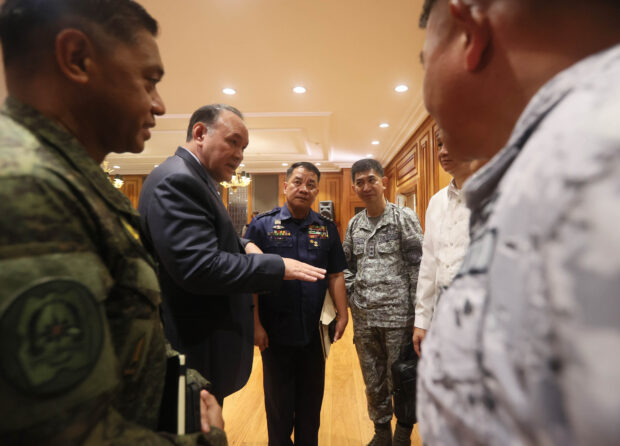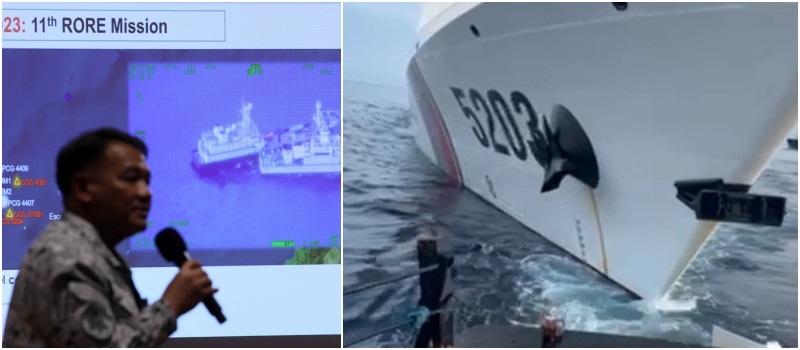PH: WPS boat collisions a ‘serious escalation’

TOP BRASS HUDDLE | Defense Secretary Gilberto Teodoro Jr. (second from left), Armed Forces chief Gen. Romeo Brawner Jr. (left), Coast Guard Adm. Ronnie Gavan, Navy Vice Adm. Toribio Adaci Jr. and other military officials go into a huddle after a command conference with President Marcos at Malacañang on Monday, Oct. 23, 2023, following China’s latest harassment of Philippine supply boats bound for Ayungin Shoal. (Photo by MARIANNE BERMUDEZ / Philippine Daily Inquirer)
MANILA, Philippines — Defense Secretary Gilberto Teodoro Jr. on Monday called the collisions between Chinese ships and Philippine boats carrying supplies for Filipino troops on Ayungin (Second Thomas) Shoal “a serious escalation of the illegal activities conducted by the Chinese government in the West Philippine Sea (WPS).”
“The Philippine government views the latest aggression by China as a blatant violation of international law. China has no legal right or authority to conduct law enforcement operations in our territorial waters. We are taking this incident seriously at the highest level of government,” Teodoro said in a press briefing at Malacañang.
He also accused Beijing of “deliberately obfuscating the truth” about the incident by “distorting the story to fit its own ends,” saying the “legitimate” rotation and resupply (Rore) mission was being conducted within the country’s exclusive economic zone (EEZ) “when Chinese Coast Guard and maritime militia vessels, in blatant violation of international law, harassed and intentionally hit Unaizah May 2 and the Philippine Coast Guard (PCG) vessel BRP Cabra.”
China “has no jurisdiction, authority or right to conduct any operations” within the Philippines’ EEZ, Teodoro stressed as he described its actions as “an egregious violation and illegal act.”
Marcos orders probe
The defense chief confirmed that President Ferdinand Marcos Jr. called a command conference of the national security and defense cluster earlier in the day as he also ordered the PCG to conduct an investigation into the collisions and to submit the findings to him “for final disposition” within five days.
For the National Security Council (NSC), the continued aggression by Chinese maritime forces against Philippine ships carrying out Rore missions could lead to “disastrous results” should Beijing pursue its “provocative actions” in the West Philippine Sea.
“While no lives were lost in the collisions [on Sunday], China’s provocative and irresponsible actions can clearly impede once again the safety of the Filipino crew,” NSC Assistant Director General and spokesperson Jonathan Malaya said.
He maintained that Unaizah May 1 and 2, which had been hired by the Philippine Navy to deliver supplies to troops stationed at BRP Sierra Madre, a grounded ship serving as a military outpost on Ayungin Shoal, were on a legitimate mission.
China claim ‘collapses’
Malaya, speaking on behalf of the National Task Force for the West Philippine Sea, reiterated its condemnation of the incident as he also disputed the China Coast Guard’s claim that it was only conducting “law enforcement activities” in the area.
“Moreover, their claim that their actions were professional and legitimate collapses in the face of overwhelming evidence to the contrary,” Malaya added, referring to videos and photos obtained by the military which showed the aggressive actions of the Chinese vessels toward Filipino ships.
Asked if the government could invoke the United States-Philippines Mutual Defense Treaty (MDT) following the incident, he replied that there was no need to do so just yet.

THEREWAS CONTACT | Philippine Navy Vice Adm. Toribio Adaci Jr. (left) and other government officials hold a press briefing at Malacañang on Monday on the collisions between Chinese vessels and Filipino boats on a rotation and resupply mission to BRP Sierra Madre. In one of the incidents, China Coast Guard Vessel No. 5203 (right) collided with Unaizah May 2 which was carrying supplies for Filipino troops on Ayungin (Second Thomas) Shoal. —MARIANNE BERMUDEZ/SCREENGRAB
“[Even] if we want to, it’s not yet timely because according to the treaty, we can only invoke [it] in cases of attack on a public vessel. So this means, whether it be a Philippine Coast Guard, a Philippine Navy [or] a Bureau of Fisheries and Aquatic Resources vessel, if there is an armed attack here, that is the only time that we can invoke the MDT,” Malaya said, clarifying that this was his personal opinion.
In a separate briefing, Department of Foreign Affairs (DFA) spokesperson Ma. Teresita Daza told reporters that further study was needed to determine whether Sunday’s collisions could trigger the treaty.
“The MDT is invoked when there is an armed attack. The incident that happened is aggressive and dangerous. It’s a provocation on the side of China. But at this point, whether it will constitute an armed attack that would allow the invoking of MDT is something that needs to be studied,” she explained.
Scope of treaty
Maritime law expert Jay Batongbacal, on the other hand, said that while the collisions could not be considered an armed attack on the country, it could still use the MDT which, according to him, was not just about military cooperation between the two allies in times of war.
“The MDT provides for an entire security framework where a whole range of actions and activities are possible— from legal, diplomatic, economic, to political,” Batongbacal told the Inquirer on the sidelines of a Senate hearing.
“All of these are available under the MDT,” he said. “There’s also a whole range of diplomatic options available to us.”
Asked whether the country’s military deal with the United States should now be operationalized, Batongbacal replied: “It is already in operation.”
“The MDT is already in force and in effect… It’s already there,” he said. “The next step now is for us to go to our allies and our friends, and use not just the MDT, but all of our (security) arrangements with other countries, to discuss our common response to this,” he added.
As to whether the collision was accidental or intentional, Batongbacal said it was clear that the Chinese vessels had been previously harassing PCG ships and small fishing boats in Ayungin and other parts of the West Philippine Sea.
“Those vessels are out in the open sea. There’s nothing around them. So you cannot possibly have that situation unless there’s an intention (to hit another vessel),” he said.
The Chinese coast guard, Batongbacal reiterated, should be called out for “deliberately undertaking maneuvers endangering the safety of life at sea in order to carry out their excessive and illegal maritime claims.”
US affirms support
The US government, meanwhile, said it stands with the Philippines “in the face of the People’s Republic of China (PRC) Coast Guard and maritime militia’s dangerous and unlawful actions” in the South China Sea.
“The United States reaffirms that Article IV of the 1951 US-Philippines Mutual Defense Treaty extends to armed attacks on Philippine armed forces, public vessels, and aircraft — including those of its Coast Guard — anywhere in the South China Sea,” the State Department stressed in a statement.
“By conducting dangerous maneuvers that caused collisions with Philippine resupply and Coast Guard ships, the PRC Coast Guard and maritime militia violated international law by intentionally interfering with the Philippine vessels’ exercise of high seas freedom of navigation,” it said.
Aside from the US, several other countries, including Canada, Japan, the Netherlands, Germany and France have condemned Beijing’s actions.
Huang summoned
On Monday, the government filed a diplomatic protest against China as the DFA summoned Chinese Ambassador to the Philippines Huang Xilian who was, however, out of town. He was instead represented by his deputy chief of mission (DCM), Zhou Zhiyong, who met with Foreign Affairs Assistant Secretary Aileen Mendiola-Rau.
“For this particular incident, the department decided to pursue the usual diplomatic route and that is to summon the Chinese ambassador and issue a protest,” Daza told reporters.
She added that the matter was “urgent and of importance” which was why the DFA decided to meet the Chinese official and convey the Philippine position on Ayungin Shoal.
“Ayungin Shoal is part of our exclusive economic zone and continental shelf and we have sovereign rights and jurisdiction over it, therefore as we did in the past, we intend to clearly convey our position that we have every right under UNCLOS (United Nations Convention on the Law of the Sea) to carry out our legitimate activities in our maritime zones and that we do not accept any form of interference,” Daza said.
In a statement, the Chinese embassy said that during the meeting between Rau and Zhou, the latter conveyed China’s “strong dissatisfaction and firm opposition” to the Philippine vessels’ supposed intrusion into its territory.
“Zhou said China once again urges the Philippines to take seriously China’s grave concerns, honor its promise, stop making provocations at sea, stop making dangerous moves, stop groundlessly attacking and slandering China,” it added.
—WITH A REPORT FROM DEMPSEY REYES
For comprehensive coverage, in-depth analysis, visit our special page for West Philippine Sea updates. Stay informed with articles, videos, and expert opinions.
